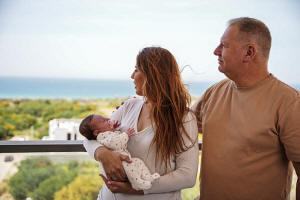Six months of Hezbollah fire keeps uprooted Israelis in limbo
 Send a link to a friend
Send a link to a friend
 [April 04, 2024]
By Maayan Lubell and Dan Williams [April 04, 2024]
By Maayan Lubell and Dan Williams
NAHARIYA, Israel (Reuters) - From a temporary seaside abode in northern
Israel, Shay and Reut Hanegbi can hear the explosions when missiles are
fired from Lebanon towards their hometown on the border, only four miles
(6 km) away.
They are among around 60,000 Israelis still uprooted from the small
frontline communities since October, when the powerful militia Hezbollah
began attacking from Lebanese hilltop villages and forest hideouts.
One rocket fell in their backyard, said Reut, 38, holding their newborn
girl Alex in the flat they are renting. It is their fourth dwelling
since October. Alex's 11-year-old sister has moved school three times in
that period.
Iranian-backed Hezbollah started firing at northern Israel a day after
Palestinian group Hamas' Oct. 7 shock attack in the south of the
country. Communities 2 miles away from the Lebanese border were hastily
evacuated.
The Hanegbis expected their evacuation to last a few weeks at most. But
as Israel presses its offensive against Hamas in Gaza, it has been
trading fire with Hezbollah almost daily.
"It has ended up going on and on. You don't see the end," Shay said.
Many homes and farms have been destroyed by guided anti-tank missiles
launched from within Lebanon. The airstrikes, shelling and rockets have
marked the worst fighting on the Israel-Lebanese front in almost two
decades. Although it has not amounted to a war, it risks becoming one,
fast.

Just on Monday, an Israeli strike in Damascus killed two Iranian
generals and five military advisers, including at least one Hezbollah
member, according to two Lebanese sources, in a high-stakes attack that
has drawn an Iranian vow of revenge.
All the while, Israeli ground forces have been preparing for a potential
invasion of Lebanon, the military top brass say, warning that
devastation from the accompanying air barrage would dwarf that suffered
by the neighbouring country in the 2006 war.
Such rhetoric may be aimed at energising U.S.-mediated de-escalation
talks that have limped along, with several deadlines floated for a
diplomatic resolution passing unmet.
For the displaced, this means uncertainty about education and employment
and no clarity on when they can go back home.
"We feel adrift, left half in, half out," said Shay.
"WE WERE NEXT"
The problem with returning home is not just the missiles that have so
far killed at least 18 people, soldiers and civilians.

[to top of second column]
|

Shay and Reut Hanegbi, who were evacuated from their home in
northern Israel, amid ongoing cross-border hostilities between
Hezbollah and Israeli forces, are photographed with their baby
during an interview with Reuters at their temporary accommodation in
Nahariya, Israel April 1, 2024. REUTERS/Miro Maman

It is the danger of Hezbollah carrying out a similar attack to that
of Hamas, whose gunmen burst into Israel, killed 1,200 people in
their homes, on army bases, along roads and at an outdoor rave, and
seized 253 hostages, including children.
"I felt like we were next," said Natalie Levy, 29, displaced with
her husband and two young children from Liman, 2 miles from Lebanon.
Frozen with fear, she said, it took a day to get a grip and leave.
Hezbollah had been signalling it was preparing such an assault for
years, said a senior Israeli official who requested anonymity due to
security sensitivities.
"What we saw in the south on October 7 was basically Hamas 'stealing
the thunder' from Hezbollah," said the official.
"If anything, Hezbollah is more of a border threat than Hamas was,"
the official said, because its attack plan has twice as many elite
fighters penetrating far deeper into Israel.
It is a danger Israel says it cannot accept. Its leaders are intent
on pushing Hezbollah back from the border. The question is how. On
Sunday, Prime Minister Benjamin Netanyahu told reporters that force
was not his first choice.
"I prefer to do this diplomatically, if possible. But if not, then
we will do it by other means. I'd rather not share operational or
scheduling details with our enemies," Netanyahu said, promising
eventual safe return for the displaced.
But though she misses her home in Kibbutz Matsuva, Sarit Oved said
sadly that she will not go back as long as she feels her children
would be unsafe.
"I don't want any more loss of life, on either side," she said.
Across the border, in southern Lebanon, around 90,000 people have
also been displaced. Israel's shelling has killed around 270
Hezbollah fighters and around 50 civilians. In Gaza, most the 2.3
million population has been uprooted with much of the enclave laid
to waste and around 33,000 people dead.
"The people of Gaza that are not involved in terror are going
through a very hard time. And my heart is with them," said Levy.
"But my heart is also with the people of Israel who are also going
through a hard time."
(Reporting by Maayan Lubell in Nahariya and Dan Williams in
Jerusalem; Writing by Maayan Lubell; Editing by Angus MacSwan)
[© 2024 Thomson Reuters. All rights reserved.]This material
may not be published, broadcast, rewritten or redistributed.
Thompson Reuters is solely responsible for this content. |